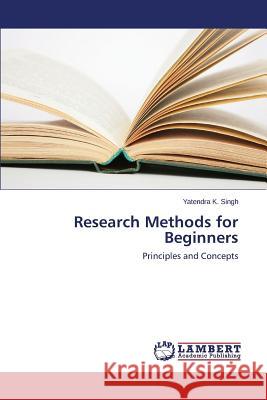Research Methods for Beginners » książka
Research Methods for Beginners
ISBN-13: 9783659787973 / Angielski / Miękka / 2015 / 208 str.
This book is designed to introduce students to the process of scientific research in the various humanities areas like education, public health, and other allied disciplines. The first and most important question potential readers should have about this book is how is it different from other text books in the market? Well, there are two key differences. First, unlike other text books, this book is not just about "research methods" but about the entire "research process" from start to end. Research method is only one phase in that research process, and possibly the easiest and most structured one. Most text books cover research methods in depth, but leave out the more challenging, less structured, and probably more important issues such as theorizing and thinking like a researcher, which are often prerequisites of empirical research. In my experience, most doctoral students become fairly competent at research methods during their Ph.D. but struggle to generate interesting or useful research questions or build scientific theories. To address this deficit, I have devoted entire chapters to topics such as "Thinking Like a Researcher" and "Theories in Scientific Research."
This book is designed to introduce students to the process of scientific research in the various humanities areas like education, public health, and other allied disciplines. The first and most important question potential readers should have about this book is how is it different from other text books in the market? Well, there are two key differences. First, unlike other text books, this book is not just about "research methods" but about the entire "research process" from start to end. Research method is only one phase in that research process, and possibly the easiest and most structured one. Most text books cover research methods in depth, but leave out the more challenging, less structured, and probably more important issues such as theorizing and thinking like a researcher, which are often prerequisites of empirical research. In my experience, most doctoral students become fairly competent at research methods during their Ph.D. but struggle to generate interesting or useful research questions or build scientific theories. To address this deficit, I have devoted entire chapters to topics such as "Thinking Like a Researcher" and "Theories in Scientific Research".











